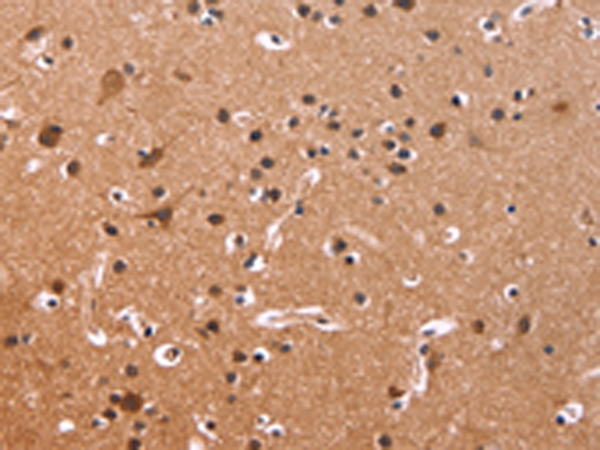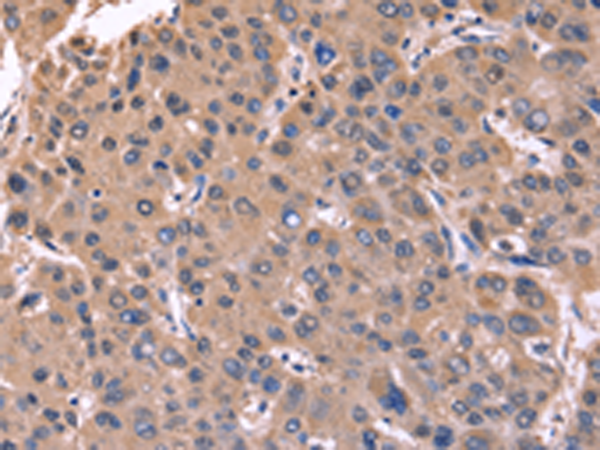

| WB | 咨询技术 | Human,Mouse,Rat |
| IF | 咨询技术 | Human,Mouse,Rat |
| IHC | 1/50-1/200 | Human,Mouse,Rat |
| ICC | 技术咨询 | Human,Mouse,Rat |
| FCM | 咨询技术 | Human,Mouse,Rat |
| Elisa | 1/2000-1/5000 | Human,Mouse,Rat |
| Aliases | ASPS; HCKID; FASPS2; CKIdelta |
| Host/Isotype | Rabbit IgG |
| Antibody Type | Primary antibody |
| Storage | Store at 4°C short term. Aliquot and store at -20°C long term. Avoid freeze/thaw cycles. |
| Species Reactivity | Human, Mouse, Rat |
| Immunogen | Fusion protein of human CSNK1D |
| Formulation | Purified antibody in PBS with 0.05% sodium azide and 50% glycerol. |
+ +
以下是关于CSNK1D抗体的3篇参考文献的简要信息:
---
1. **文献名称**:*"Casein Kinase 1 Delta Regulates Cell Proliferation via the Wnt/β-Catenin Signaling Pathway"*
**作者**:Wang X, et al.
**摘要**:该研究通过Western blot和免疫荧光技术,利用CSNK1D抗体探究了其在结直肠癌细胞中对Wnt/β-catenin通路的调控作用,发现抑制CSNK1D可降低β-catenin稳定性并抑制肿瘤生长。
---
2. **文献名称**:*"CSNK1D as a Potential Therapeutic Target in Triple-Negative Breast Cancer"*
**作者**:Lee S, et al.
**摘要**:研究通过免疫组化(使用CSNK1D特异性抗体)分析了三阴性乳腺癌患者样本,发现CSNK1D高表达与患者预后不良相关,并通过体外实验验证其作为治疗靶点的潜力。
---
3. **文献名称**:*"Temporal Control of Circadian Rhythms by CSNK1D in Mammalian Cells"*
**作者**:Gallego M, Virshup DM
**摘要**:该研究利用CSNK1D抗体进行免疫沉淀实验,揭示了CSNK1D通过磷酸化核心生物钟蛋白PER2调控哺乳动物昼夜节律的分子机制。
---
如果需要更详细的信息或特定方向的文献筛选,请进一步说明需求。
The casein kinase 1 delta (CSNK1D) antibody is a research tool targeting the CSNK1D protein, a serine/threonine kinase belonging to the casein kinase 1 (CK1) family. CSNK1D plays critical roles in diverse cellular processes, including circadian rhythm regulation, Wnt and Hedgehog signaling pathways, DNA repair, and cell cycle progression. Its activity is tightly controlled through phosphorylation and subcellular localization. Dysregulation of CSNK1D has been linked to multiple diseases, such as cancer (e.g., breast, lung, and leukemia), neurodegenerative disorders (e.g., Alzheimer's and Parkinson’s), and sleep phase disorders due to its circadian functions.
Antibodies against CSNK1D are widely used in Western blotting, immunohistochemistry, and immunofluorescence to study its expression patterns, post-translational modifications, and interactions with signaling partners. They help elucidate CSNK1D's role in pathological conditions and its potential as a therapeutic target. For instance, small-molecule inhibitors of CSNK1D are under investigation for cancer and circadian-related therapies. Researchers also utilize these antibodies to validate CRISPR/Cas9 knockout models or assess drug efficacy in preclinical studies. Commercial CSNK1D antibodies are typically validated for specificity across human, mouse, and rat samples, with applications spanning basic research and drug development pipelines.
×